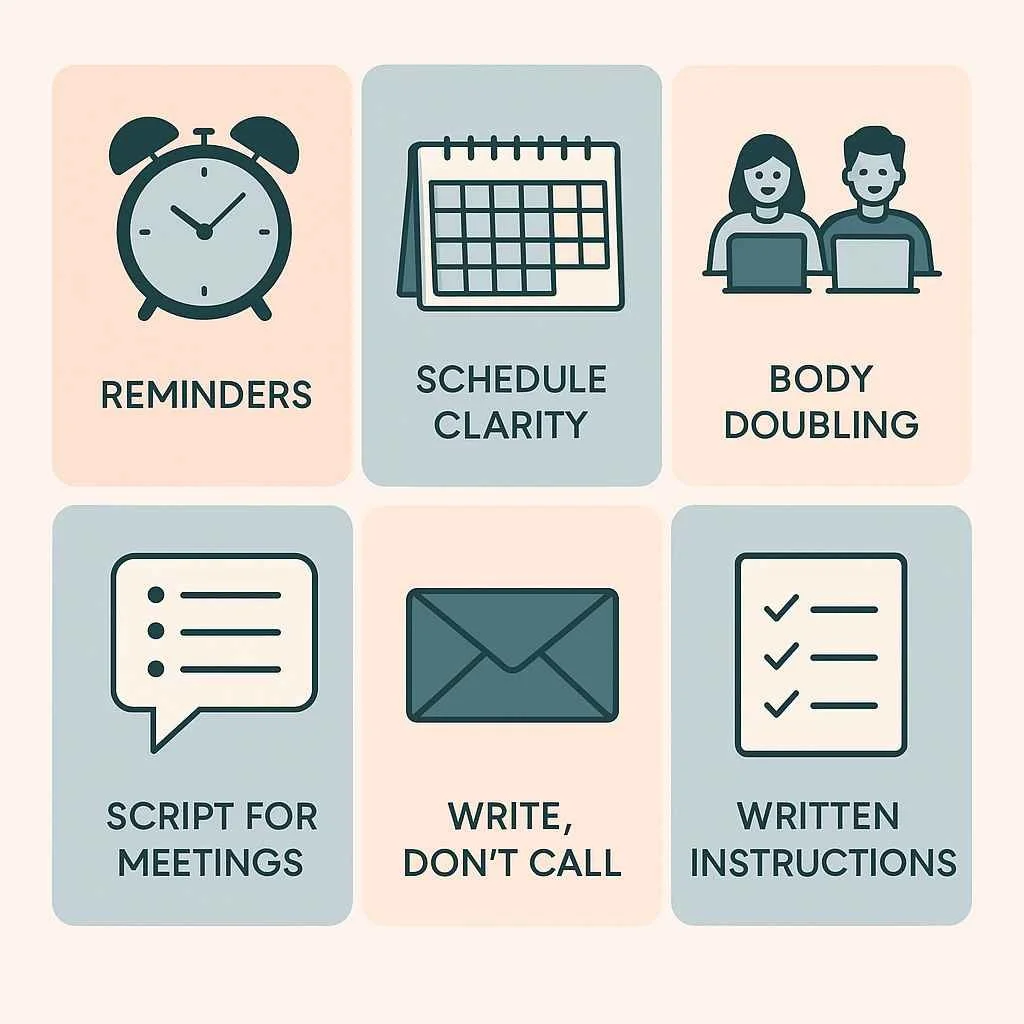ADHD Communication at Work: Common Challenges and Solutions
Attention Deficit Hyperactivity Disorder (ADHD) can make workplace conversations harder to manage. You might speak too quickly, miss social cues, or forget what someone just said. These moments can lead to stress, confusion, or feeling like you’re always a step behind.
Most misunderstandings don’t come from bad intentions. They come from differences in how the ADHD brain handles focus, timing, memory, and emotion. That gap in how people process conversation can create tension or isolation, especially in fast-paced jobs.
This article is for adults with ADHD who want to improve how they communicate at work. It’s also for friends, family, and coworkers who want to better understand what’s really going on and how to help.
Key Takeaways:
Workplace Challenges: ADHD affects how people talk and listen at work, often leading to misunderstandings, missed cues, or impulsive replies, not because of carelessness, but due to how the ADHD brain processes information.
Communication Patterns: Common struggles include interrupting, losing focus mid-conversation, forgetting verbal instructions, and feeling overwhelmed in group settings, especially in fast-paced environments.
Skill-Building Strategies: Building communication skills is possible through simple, repeatable strategies like active listening, paraphrasing, and writing down key points to stay on track.
Communication Coaching Support: Communication coaching offers structured, personalized support to help individuals with ADHD practice new strategies, understand their communication style, and build confidence in real-life work situations.
How ADHD Symptoms Affect Talking and Listening
How the ADHD Brain Processes Workplace Social Cues
Building Communication Skills with ADHD
Practical Strategies for ADHD at Work
How Coaching Supports ADHD Work Communication
How ADHD Symptoms Affect Talking and Listening
People with ADHD often know what they want to say but have trouble getting it across the way they mean to. Others might miss key parts of a conversation or respond too quickly without processing what was said. These represent their personal ADHD traits.
Interrupting or Speaking Out of Turn: Impulsivity is a core ADHD characteristic. Some people jump into conversations because they’re afraid of forgetting their thoughts. Others get excited and want to connect quickly. This can come across as rude or impatient, even when the intent is connection.
Losing Track of Details Mid-Conversation: Distractions happen fast for an ADHD brain. Someone might start a conversation with a focus, but it can drift as new thoughts pop in. They may nod along while mentally stuck on something said earlier, missing what’s said next.
Trouble Remembering Verbal Instructions: Working memory tends to be weaker with ADHD. A person might hear directions clearly but forget them moments later, especially if they're not written down. This isn’t carelessness; it’s a brain processing issue.
Feeling Overwhelmed in Group Settings: Large meetings or fast-paced discussions can be hard to follow. Multiple voices, side chatter, and shifting topics can flood an ADHD brain, making it hard to stay engaged or respond at the right time.
How the ADHD Brain Processes Workplace Social Cues
For some individuals with ADHD, understanding social cues at work can be a significant challenge. The ADHD brain may struggle to process tone, body language, and facial expressions during fast-paced interactions.
This can lead to misreading conversations, interrupting others, or missing key points, especially in brainstorming sessions or important meetings.
Misjudging how something was received is common. Nonverbal cues like eye contact or subtle reactions might go unnoticed, causing confusion or misunderstandings.
Over time, repeated communication issues can lead individuals with ADHD to avoid conversations, particularly after negative experiences or unclear feedback.
These patterns can impact mental health and team dynamics. However, practical strategies like using visual aids, improving self-awareness, and seeking professional guidance can enhance communication and reduce stress.
Building Communication Skills with ADHD
For individuals with ADHD, improving communication means developing simple, repeatable habits that support focus and clarity. Challenges like interrupting, losing track, or misreading cues can be managed with strategies that build stronger, more effective communication at work and in daily life.
Active Listening Techniques That Actually Work
Making eye contact without staring
For individuals with ADHD, maintaining eye contact can be tricky. Try looking at the person’s eyes for a few seconds, then shift your focus briefly to their nose or forehead.
This creates natural engagement without feeling intense or forced, helping the speaker feel heard while reducing pressure on oneself.
Using short verbal cues to show you’re engaged
Simple phrases like “I see,” “Got it,” or “That makes sense” can be powerful. These verbal nudges show active listening and keep you present, even when your mind starts to wander. They also help the speaker know you’re tracking the conversation in real time.
Paraphrasing to confirm what you heard
Repeating the main points in your own words helps confirm understanding and keeps communication clear.
For example, saying “So you’re asking me to focus on the final section first, right?” reduces misunderstandings and shows you're engaged, even if ADHD symptoms make it easy to lose track.
Writing down key points during conversations
Having a notepad or digital device handy to jot down ideas helps you stay focused and process information better.
Especially during complex projects or long-term discussions, writing things down can reduce stress and make it easier to recall main points later.
Effective Communication Starts Before You Speak
Preparing bullet points ahead of meetings
One of the most effective strategies for ADHD communication at work is to outline your main ideas in advance.
Bullet points help keep your thoughts organized and minimize the risk of going off-topic or forgetting important points during the conversation.
Taking a moment to breathe before jumping in
When impulsive actions are driven by excitement or anxiety, taking a deep breath before speaking can reset your focus.
It gives your brain time to process information and respond more thoughtfully, especially in high-pressure or important conversations.
Asking clarifying questions before responding
If you’re unsure about what someone meant, asking for clarity helps avoid assumptions. Phrases like “Just to be clear, are you saying…” or “Do you mean…” confirm understanding and support more effective communication, particularly when social cues are unclear.
With awareness and the right tools, individuals with ADHD can enhance communication, reduce misunderstandings, and feel more confident participating in both casual chats and complex discussions.
Practical Strategies for ADHD at Work
Here are some strategies that support focus, clarity, and effective communication on the job:
Tools to Support Communication:
Use timers, alarms, and calendars to stay on schedule and remember key tasks.
Try body doubling (working alongside someone) to improve focus while preparing emails or conversations.
Keep scripts or templates ready for common workplace situations to reduce anxiety and stay on point.
Workplace Accommodations That Help:
Request written instructions after meetings to support memory and clarify next steps.
Choose email over phone calls when possible to give yourself time to organize your thoughts and respond clearly.
Create communication agreements with your team to set expectations for feedback, follow-ups, and preferred methods of communication.
These strategies can help individuals with ADHD reduce stress, improve communication, and stay focused on what matters most.
How Coaching Supports ADHD Work Communication
Communication coaching by a speech pathologist with expertise in ADHD can be a powerful tool for improving communication skills. They can offer structured, step-by-step guidance to help you identify your strengths, develop self-awareness, and practice new strategies in real-life work situations.
One of the key benefits of coaching is learning how to communicate effectively in a way that fits your unique communication style. Coaches often introduce practical tools, like using visual aids, creating scripts, or applying active listening techniques, that make it easier to understand and respond to others.
They also help you prepare for challenging moments, such as giving constructive feedback, joining brainstorming sessions, or dealing with workplace misunderstandings.
Over time, coaching builds confidence and consistency. It helps reduce negative emotions tied to past communication struggles and offers a safe space to practice new approaches.
With regular support and accountability, individuals with ADHD can develop the conversational skills they need to thrive at work, even in high-pressure environments or during complex projects.
ADHD and Public Speaking
Check out our blog on ADHD and public speaking for more information!
Frequently Asked Questions About Employees with ADHD
1. What do ADHD people struggle with at work?
People with ADHD often face challenges with executive functioning skills such as focus, time management, task organization, and memory. At work, this can lead to difficulty starting or completing tasks, keeping track of important details, or managing long-term projects.
Communication may also be affected, including interrupting, missing social cues, or forgetting verbal instructions, especially in fast-paced or unstructured environments.
2. How do you communicate with someone with ADHD at work?
Effective communication with someone who has ADHD involves being clear, direct, and supportive. Use written follow-ups when possible to reinforce verbal conversations.
Allow extra time for processing, avoid overloading with information, and check in regularly to confirm understanding. Creating communication agreements or using visual aids can also reduce misunderstandings and improve collaboration.
3. How does ADHD affect communication skills?
ADHD can impact communication in several ways. Individuals may interrupt, lose track of conversations, or struggle to organize their thoughts under pressure. Difficulty reading nonverbal cues or staying focused can lead to misunderstandings.
These challenges often stem from how the ADHD brain processes information, but with the right strategies and support, communication skills can significantly improve.
4. Is ADD classified under ADHD?
ADD is now classified as a type of ADHD. What was once called Attention Deficit Disorder (ADD), characterized by inattention without hyperactivity, is now known as ADHD, Predominantly Inattentive Presentation.
The term ADHD (Attention Deficit Hyperactivity Disorder) is the official medical diagnosis and includes three presentations: inattentive, hyperactive-impulsive, and combined. While ADD is still used informally, all forms are now diagnosed under the ADHD umbrella.
How Connected Speech Pathology Can Help
At Connected Speech Pathology, we help individuals with ADHD overcome communication challenges that can affect workplace success, like staying focused during meetings, organizing thoughts, learning communication styles, or reading social cues. Our licensed speech-language pathologists create personalized, goal-oriented therapy plans that focus on practical strategies for clear, confident communication.
Our services are fully remote, making it easy to access expert support from home or work. Whether you're preparing for important conversations, managing impulsivity, or improving time management, we offer step-by-step guidance tailored to your needs and schedule.
With years of experience delivering effective virtual care, we've helped professionals across industries strengthen their communication skills and reduce the stress of workplace interactions.
Summary
Workplace communication can feel overwhelming when you’re living with ADHD, but it doesn’t have to stay that way.
With small, practical changes and consistent support, it’s possible to handle conversations more smoothly, build stronger relationships, and communicate with confidence.
Whether you're learning new strategies, working with a coach, or getting professional therapy support, every step you take can lead to meaningful progress and less stress at work.
About the Author
Allison Geller is a communication coach, speech-language pathologist, and founder of Connected Speech Pathology, an international online practice providing professional communication coaching and speech therapy for children, teens, and adults. With more than two decades of experience, she has worked in medical and educational settings, published research on aphasia, and leads a team of specialists helping clients improve skills in public speaking, vocal presence, accent clarity, articulation, language, fluency, and interpersonal communication.










